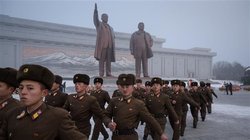 North Korean state media say Pyongyang will never unilaterally give up its nuclear weapons program unless the United States removes its nuclear threat first, amid a protracted deadlock in nuclear negotiations between the two countries over the sequencing of the denuclearization process in the Korean Peninsula and the removal of international sanctions.
North Korean state media say Pyongyang will never unilaterally give up its nuclear weapons program unless the United States removes its nuclear threat first, amid a protracted deadlock in nuclear negotiations between the two countries over the sequencing of the denuclearization process in the Korean Peninsula and the removal of international sanctions. RNA - The official Korean Central News Agency (KCNA) said in a statement released on Thursday that the denuclearization of the Korean Peninsula had to mean “completely eliminating the US nuclear threat to Korea,” as well as all neighboring areas.
“When we refer to the Korean Peninsula, the term encompasses the area of DPRK plus South Korean territory, where US nuclear weapons and other forms of aggression forces are deployed,” the statement said, using the initials of North Korea’s official name — the Democratic People’s Republic of Korea.
“When we refer to the ‘denuclearization of the Korean Peninsula’ as well, it should be correctly understood as removing all nuclear threat factors from not only the North and the South but from all neighboring areas,” it added.
It said Pyongyang rejected US calls for it to unilaterally denuclearize, and added that Washington had to abandon the “delusion” of forcing the country into giving up its nuclear weapons “via pressure and oppression.”
“It is obvious that denuclearization of the Korean Peninsula is a joint business that cannot be achieved unless both Korea and the United States strive together,” the KCNA statement said. “In this sense, the denuclearization of the Korean Peninsula should be defined as ‘completely eliminating the US nuclear threat to Korea’ before it can eliminate our nuclear deterrent.”
The statement by the North Korean state media also suggested that Pyongyang would demand that Washington withdraw or significantly reduce the 28,500 US troops stationed in South Korea, which has been a major sticking point hindering a potential disarmament deal.
A summit between US President Donald Trump and North Korean leader Kim Jong-un in Singapore last June opened up dialog on denuclearization of the Korean Peninsula between the two countries after months of exchanging military threats.

There has been talk by the US of a second summit early next year, but it is unclear whether North Korea would agree to the holding of the summit.
US-North Korea talks for a denuclearization deal appear to have stalled, in part due to disagreements over the timing of sanctions relief.
Washington seeks the complete and irreversible dismantling of North Korea’s nuclear program first, while Pyongyang is demanding a solid guarantee of its security and the removal of Washington’s nuclear umbrella protecting allies South Korea and Japan.
847/940